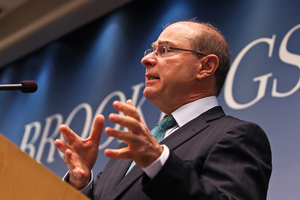Joseph E. Aoun, president of Northeastern University, said America’s higher-education system has flourished because of its social compact with the country’s citizens. As part of that agreement, institutions provide education and help people live fulfilling and accomplished lives, while also ensuring that the U.S. remains strong and competitive on a global level.
Now, Aoun said, a new survey commissioned by Northeastern serves as a “wake-up call” for higher education to become more aware of students’ evolving needs. And the higher education community, he said, is taking notice.
“The social compact has to be rethought and redefined, and we are here to do that,” Aoun said in his keynote address at a forum Tuesday morning in Washington D.C. The forum, entitled “Innovation Imperative: The Future of Higher Education,” was hosted by Northeastern in collaboration with the Brookings Institution and attended by leaders from government, academia, the news media and the private sector.
The results of the national opinion poll were released at the event. The poll was conducted by FTI Consulting, and was based on 1,001 telephone interviews of American adults and an oversample of 250 American young adults, ages 18 to 30, surveyed online in October.
Among the top findings were that Americans strongly value higher education and that there are more opportunities today to achieve a college education than in past generations. However, while respondents believe the U.S. is a global leader in higher education, they said greater investments are needed to maintain that standing. They also acknowledged there are significant obstacles making it harder to achieve a college degree today, and they called for greater innovation to ensure the U.S. remains at the forefront of higher education in the world.
In particular, Aoun noted that survey participants called for more flexibility, online/hybrid education options and opportunities for experiential learning, entrepreneurship and global experiences. He also pointed to respondents’ concerns of rising costs, global competition, students finding jobs after graduation and graduates today having fewer opportunities than their parents.

Northeastern President Joseph E. Aoun delivers the keynote address at a higher-education forum on Tuesday in Washington, D.C. Photo by Paul Morigi.
However, Aoun cited an “explosion of innovation” in higher education that is aimed at addressing these concerns, including shortening the path to degree and advancements in how academic courses are assessed.
Aoun has been a national leader on issues critical to higher education. He is board chair of the American Council on Education and a member of an academic advisory council that reports directly to Homeland Security Secretary Janet Napolitano.
The event also featured a panel discussion moderated by David Leonhardt, the Washington bureau chief of The New York Times. Panelists comprised: Molly Broad; president of the American Council on Education; Michael Horn, co-founder of Innosight Institute; Daphne Koller, co-founder of Coursera; U.S. Congressman George Miller, senior Democratic member of the House Education and the Workforce Committee; John Sexton, president of New York University; and Prateek Tandon, an economist at the World Bank.
The engaging panel discussion shifted between a range of topics, from the cost of higher education to quantifying the impact of a college education. Leonhardt said that while the discussion focused largely on the ways to improve higher education in America, the system largely works very well and “remains the envy of the world.” He also said it produces a “phenomenally broad return,” citing the current 3.8 percent unemployment rate for college graduates, well below the national average.
However, Leonhardt pointed to statistics that show only half of those who enter college earn degrees, as well as the gap in access to higher education based on economic status.
Early in the panel discussion, Sexton commented on how colleges and universities can maintain their strengths while also addressing their weaknesses.
“I think the single most important thing that higher education has to do is do what it does best, and that is ‘think,'” Sexton said. “Thinking is the essence of what universities have been doing for a thousand years, and as we think, we should be unafraid to disrupt the received wisdom. That’s also been a great strength in the advancement of knowledge.”
Applying those ideas to today’s challenges, Sexton said higher education must continue to find new ways of being creative and innovative, and also embrace disruptions from technology and globalization as “opportunities to create blended nuanced solutions.”
Later, the discussion shifted to the assessment of college learning, and Koller was asked whether more must be done to refine this evaluation.
“One of the things that has emerged from the use of technology in education is that the questions of what exactly are people learning and how do we assess it has to come to the front and center of how these new courses are constructed,” Koller said. “For courses with thousands of people in them, it’s not possible to just use the traditional, somewhat ad hoc assessment mechanisms that we’ve employed in higher education.”
Koller acknowledged that most courses don’t have a rigorous structuring of learning outcomes and how assessments align with those learning outcomes. “When you’re constructing a course for thousands of people, that has to occur,” she said. “This is not the solution to the assessment problem, but it’s a very valuable step along the way.”
On that same topic, Leonhardt asked Broad about how to respond to a parent who asks how to determine what his or her child actually learned in college.
“[That] is the focus of a considerable amount of effort today in the issue of assessing learning outcomes and to ensure that the things that really matter,” Broad said. “That ability to have intellectual skills, to have a deeper knowledge in a specialized area, to apply what you have learned in a real-world environment, to be able to communicate effectively, both orally and through writing. Those are the things that I would urge they look for.”